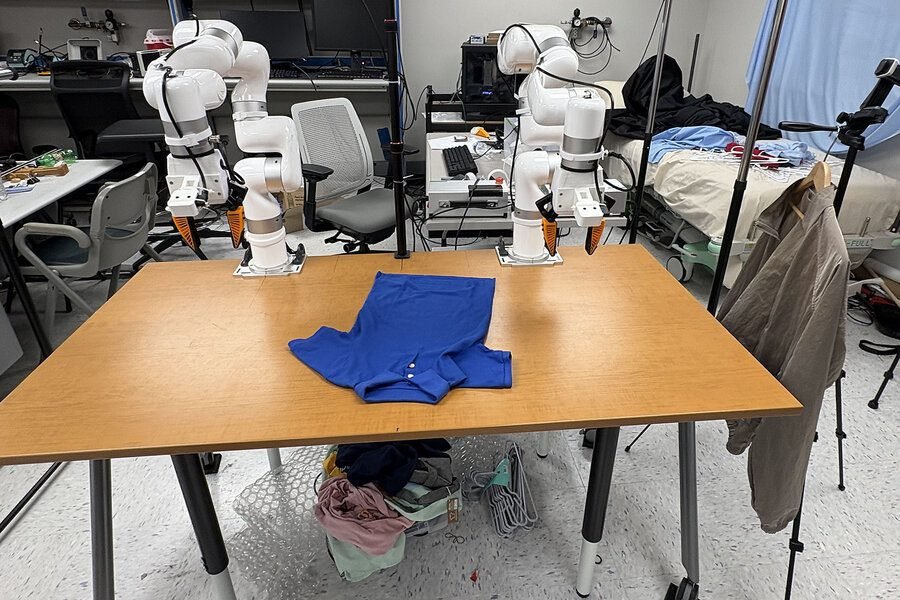At Carnegie Mellon University’s Robotics Institute, robots are being trained to use artificial intelligence to do everyday tasks. One curvy, tubelike robot with a claw for a hand is learning how to hang clothes. Another is being trained to help people get dressed – it can grab onto a sleeve and pull it up a person’s arm.
The robots are examples of something called physical AI: essentially, robots that use artificial intelligence to perceive their environment and make decisions with some degree of autonomy. The university sees physical AI as a technological frontier where it can plant a flag – and it’s doing this work in a building that carries echoes of Pittsburgh’s industrial past.
In a passageway between lab rooms at the institute – housed in what a top faculty member says used to be the Bureau of Mines – a pair of tracks mark the path where steel mining carts used to bring equipment to be inspected. It’s a visible reminder of Pittsburgh’s steel boom, which brought in a massive wave of manufacturing and job growth until the industry collapsed in the early 1980s.
Why We Wrote This
Pittsburgh, once known as a center of the steel industry, now wants to be a hub for the kind of artificial intelligence that makes a difference in peoples’ daily lives. What happens here could produce innovations that affect the economy on a broader scale.
Now, Pittsburgh is banking on being a leader in a potential new industrial revolution. With a pool of talent from Carnegie Mellon and the University of Pittsburgh, the city ranks No. 7 on the Brookings Institution’s benchmarking of nearly 200 U.S. artificial intelligence hubs. City leaders promote Pittsburgh’s potential to be a global AI hub. They say the AI revolution is a natural extension of the region’s industrial history, and will bring in blue-collar jobs by way of data center construction. They also say Pittsburgh’s culture means its AI innovation is focused on technologies that can solve significant problems for people.
“We’re not a land of dating apps,” says Meredith Meyer Grelli, the managing director of Carnegie Mellon’s Swartz Center for Entrepreneurship. “We’re like, figure [stuff] out that makes the world a better place to be in.”
As with all bets, Pittsburgh’s wager on AI comes with risks. After a decades-long economic slump, the AI boom has brought venture capital to the city, with investment reaching a record high of $999 million last year. But AI is still a new industry, and it’s not yet clear whether people will flock to robots that could empty their dishwashers or perform surgeries. A number of high-profile figures like OpenAI CEO Sam Altman suggest investors have become overexcited about the technology – and if they pull back, the boom could fizzle.
Even if AI growth continues, city leaders’ predictions could still fall short. Unlike during the steel mining boom, for example, many of the jobs created by AI – like construction jobs for data centers – so far are temporary.
And although Pittsburgh has seen innovations in many areas of AI, city leaders seem especially quick to tout its capabilities in physical AI – an area that not everyone sees as the future.
“Robotics is a slow field that makes slow progress,” says Zico Kolter, a co-founder of Gray Swan AI and a professor at Carnegie Mellon’s School of Computer Science, referring in part to physical AI.
But those pushing for Pittsburgh to lean into AI see reasons to be optimistic. Artificial intelligence in general is in a moment of significant growth, with AI’s global market value – generally determined based on factors including capital investment and future growth potential – projected to exceed $4.8 trillion by 2033, according to a United Nations report.
Many people already interact with AI by using chatbots like ChatGPT, or when they see an AI overview as the result of a Google search. Physical AI is more rare in everyday life, but is becoming more visible – for example, with driverless taxis in cities like San Francisco. That technology was pioneered at Carnegie Mellon.
“These are technologies that spread through the whole economy,” says Mark Muro, a senior fellow at Brookings Metro. “If this technology is so important for productivity gains, it really matters who has it and who doesn’t.”
An attempt to own the moment
A one-mile corridor starting in Bakery Square, a bustling office district with housing, shopping and restaurants, offers a glimpse into the city’s rising technology profile. Dubbed “AI Avenue” by developers last year, the stretch of blocks houses 26 tech companies developing AI, including physical AI – from big names like Google and Duolingo to fast-growing startups.
Joanna Doven, a founding CEO of a government consulting firm, says AI Avenue produced a “light bulb moment” a couple years ago. She recalls noticing a flurry of tech-related leasing in the area, and wondered, “Is anybody paying attention?”
Her thinking was, “This is a moment we should own.” Now she leads Pittsburgh’s newly formed AI Strike Team, a 13-member group that strives to unite key players in business, academia, and the government to make the city a leading technology hub. The team’s pitch includes the intangible factor of Pittsburgh’s industrial culture.
“We have founders that are here for a reason,” says Ms. Doven. “The gritty, hard-work ethic of Pittsburgh is still here, and that’s something that they need to succeed.”
She says Pittsburgh’s technological development focuses on health care, physical AI, and defense. This year, the city saw three new AI companies become “unicorns” – companies worth more than $1 billion. All three fit at least one of those categories.
Pittsburgh is still no Silicon Valley, says Mr. Muro, a co-author of the Brookings AI report. The California region known as a center of tech boasts at least 60 of these “unicorn” companies. But he says Pittsburgh’s manufacturing legacy allows it to offer unique contributions.
“The U.S. AI boom is impressive but it’s imbalanced – oriented too little toward real-world, often manufacturing, use cases,” writes Mr. Muro in an email to the Monitor. “But this is what Pittsburgh is working on and good at. … We need a bridge that connects AI and manufacturing.”
The jobs question
A short drive from AI Avenue is Carnegie Mellon University, home to the country’s top-ranked AI program according to the U.S. News and World Report, and widely considered to have one of the strongest robotics programs – a combination that’s a fit for physical AI.
On a recent afternoon, a drone hovers over the sidewalk bridging the campus with the neighboring University of Pittsburgh. Inside the Swartz Center for Entrepreneurship on CMU’s campus, students work at a cluster of tables piled with cables and other equipment, next to a small human-shaped robot that hangs from a cable. They’re collecting data on how to make an AI algorithm inhabit a physical form.
Carnegie Mellon is at the center of “so many developments, so many companies and so many economies,” says Mike Embrescia, the chief development officer of the physical AI company Carnegie Robotics, which is not directly connected to the school.
College graduates have gone on to found businesses like Aurora Innovation, a Pittsburgh-based company that recently became the first to launch an AI-based commercial driverless trucking service on public roads.
But these college graduates are also bearing the brunt of a softening labor market, according to new data. And many people speculate that AI development may lead to unemployment, as robots could be created to do tasks more efficiently than humans, without having to be paid.
When people find out he works in AI, Mr. Embrescia says, “You typically get the remark, oh, they’re gonna take my jobs someday.”
Pennsylvania has made an effort to link AI with job creation. In June, Pennsylvania Governor Josh Shapiro and leaders from Amazon announced a $20 billion investment in AI infrastructure resulting in the construction of two new data centers in the state. Gov. Shapiro says the data centers will result in 10,000 temporary construction jobs as well as 2,400 permanent jobs.
Ms. Doven thinks that rather than just taking jobs, AI can help fill positions that are already vacant. “In the Pittsburgh region, there’s two available jobs for every one person that wants a job,” she says as she grabs a late lunch in Bakery Square. Pointing to the restaurant’s kitchen, she says the staff here have been hiring dishwashers at well above market rate because of the difficulty in finding workers.
She admits the effects of AI on job security are uneven across industries.
“Software jobs are in peril,” she says. “Highly specialized AI jobs are in demand.”
For some people, job loss from AI is already a reality. Language learning company Duolingo drew criticism for laying off about 10% of its contractor workforce early last year as it expanded reliance on AI.
A recent Brookings report found that the U.S. labor market had not yet been notably impacted by AI, although the report’s writers emphasized that could change as the technology develops.
“The new steel”
The Lawrenceville neighborhood in Pittsburgh was once labeled a blighted community. When the steel industry collapsed, the steel mills and foundries shuttered, leaving the buildings as hollow reminders of past prosperity.
Now, Lawrenceville has a new identity. Underpinning the community is the National Robotics Engineering Center (NREC), a technology organization formed by Carnegie Mellon University that’s housed in what used to be a steel foundry. The surrounding area has been dubbed “Robotics Row” for the cluster of robotics and artificial intelligence companies that have sprung up largely within the last decade.
This is where the self-driving unit of Uber got its start about 10 years ago. And this is where Carnegie Robotics, operating out of an old steel mill across the street from NREC, recently designed a piece of AI software, which clips onto soldiers’ backpacks, that can translate languages onto soldiers’ eyeglasses or map out battlefields in 3D.
It’s the kind of innovation Pittsburgh strives to be known for.
“We were the center of the world around steel,” says Mark Henderson, vice chancellor of the University of Pittsburgh and a member of Pittsburgh’s AI Strike Team. “AI is the new steel.”










